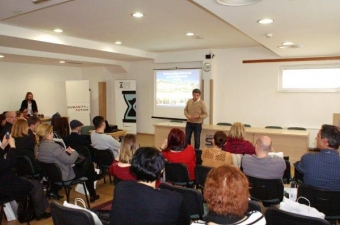The second cycle of presentations organised for high school teachers as a part of the project “Historija, Istorija, Povijest – Lessons for Today” (HIP Project) took place in Mostar, Bosnia and Herzegovina (BiH). Eighty history teachers from BiH, Croatia, Serbia and the Former Yugoslav Republic of Macedonia took part in the three-day seminar which aims to promote critical thinking about sensitive topics from the recent war past among their students.
During the two two-hour sessions, Almir Alić, ICTY representative in BiH, introduced the teachers with the work of the ICTY and the important role war crimes trials have in facing the past. The teachers from the former Yugoslavia were keen to learn about the ICTY experiences in working with young students who – although being born after the conflicts – share the experiences of victims coming from their own families or the wider community. The participants agreed that it is very important to inform the students about the facts established by the ICTY, because only facing the past through an organised process can produce experiences which will help prevent similar crimes from repeating in future.
The HIP project is implemented by the Anne Frank House in cooperation with local partner organisations in the region. Kerim Somun, project coordinator with the Youth Initiative for Human Rights in BiH, underlined the importance of cooperation between the non-government organisations and the ICTY: “It is very important to present the work of the ICTY in prosecuting war crimes cases because it is a way of distinguishing socially acceptable behaviour from the unacceptable one, in order to efficiently prevent the repetition of crimes in future and establish the rule of law".


